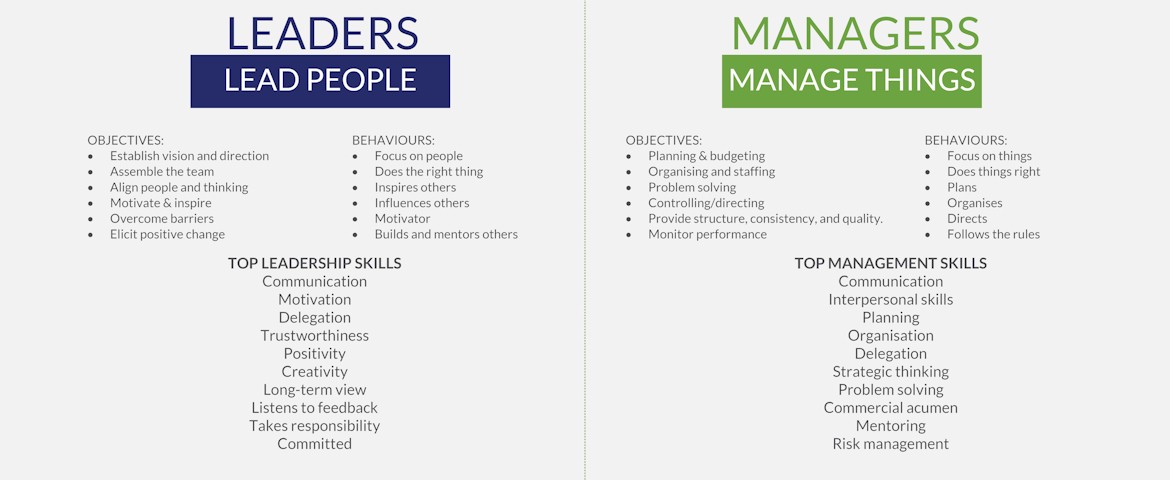Aren’t leadership and management just the same thing?
Leadership and management are not the same thing, and that is a common misconception. After-all, we often call our leaders “managers” by title. So what is the difference between leadership and management? A simple way to think about it is that leadership is that act of inspiring and motivating others to reach a common goal, while management is concerned with things like planning, organising, and control. By these very definitions, someone who is in a management role will need to do both at certain times.
So, let us take a closer look at what behaviours, skills, and examples we have for each, in a little more detail.
Leadership
If a leader’s role is to inspire and motivate others to reach a common goal, then a leader needs to understand how to motivate people, how to encourage them along the way, and how to communicate a clear vision of what the desired outcomes look like. So, these things require a focus on people, relationships, adaptability, and some pretty good communication skills.
To focus on people, a leader assembles the right team (or unifies an existing team), sets the direction, and behaves in such a way to ensure everyone in the team is following agreed values. They need to spot and resolve staff conflict that inevitably arise, and stay the course. A leader also encourages staff, leads by example, remains positive, and plays a support role. All of this builds team member confidence.
A good leader needs to be confident and positive in their own plan and be trustworthy in order to inspire others to follow a shared goal. To achieve this they need to listen and take on feedback from others, take personal responsibility for the team, and remain committed to the cause. A successful leader focuses on the needs of their people, motivates and inspires, and remains open and flexible to new ideas. To show true leadership, they are also prepared to make unpopular calls, if they know it is the right one. The best leaders I’ve worked with are also highly knowledgeable in their field, but don’t pretend to have all the answers.
[You may want to check out our article on sought after leadership skills for 2020 and beyond]
Management
On the flip-side, the focus of management is on things rather than people. The associated activities are planning, organising, and control. A good manager needs to be skilled in these areas. To support this, they need to be able to delegate tasks, solve problems, have good commercial acumen, and think strategically.
The ability for a manager to be able to mentor staff around process and organisational knowledge is key to build staff competence and performance. This allows a manager delegate tasks more effectively, ensuring the right individuals are working on the right things. Work is well structured and prioritised so important tasks are completed first. All of this improving team efficiency.
Finally, by putting in good management systems and processes means the team focus on the right performance measures and outcomes. This not only improves planning and quality control, but also enables the early identification of problems. The old saying is still true today, you can’t manage what you’re not measuring. Just make sure you’re measuring what’s important.
[Also, you may want to check out our article on the most sought after management skills]
Focusing on the differences between Leadership and Management
To lead is to manage, to manage is to lead…
They are two sides of the same coin, but important to differentiate. To be good leader, you need to be able to manage well. And to manage successfully, you will need to lead well. Both skills are equally important. As your skills in both improve, chances are you will gain more responsibility and your leadership scope will increase. When this happens, you may need to manage more teams, and more complex outcomes. The greater the scope the more leadership you will need to do, and the smarter you will need to get at management.
Do you have examples or feedback?
If you have any questions or feedback on the topic covered, please share in the comments below.
